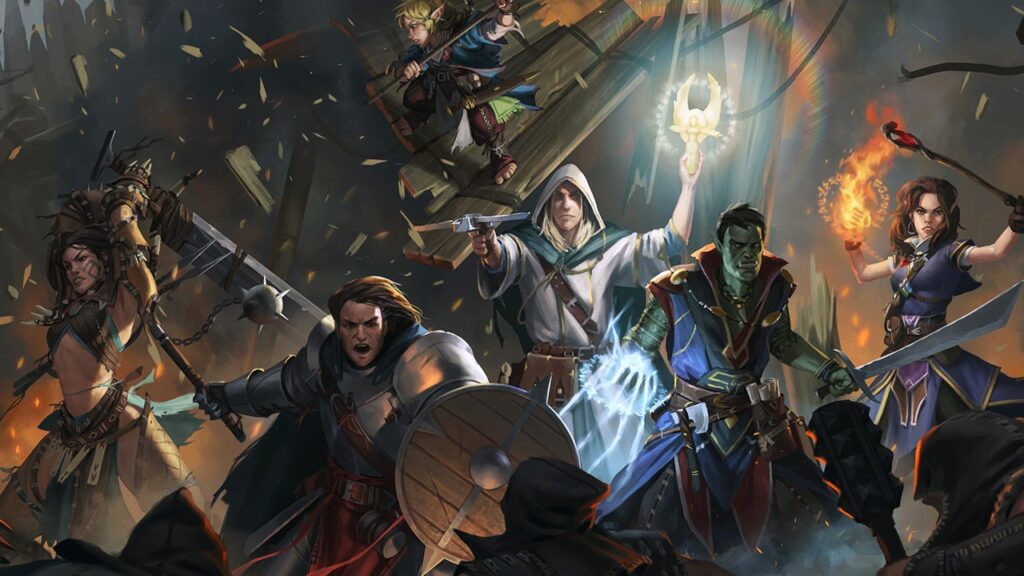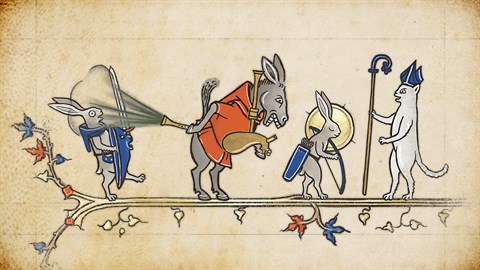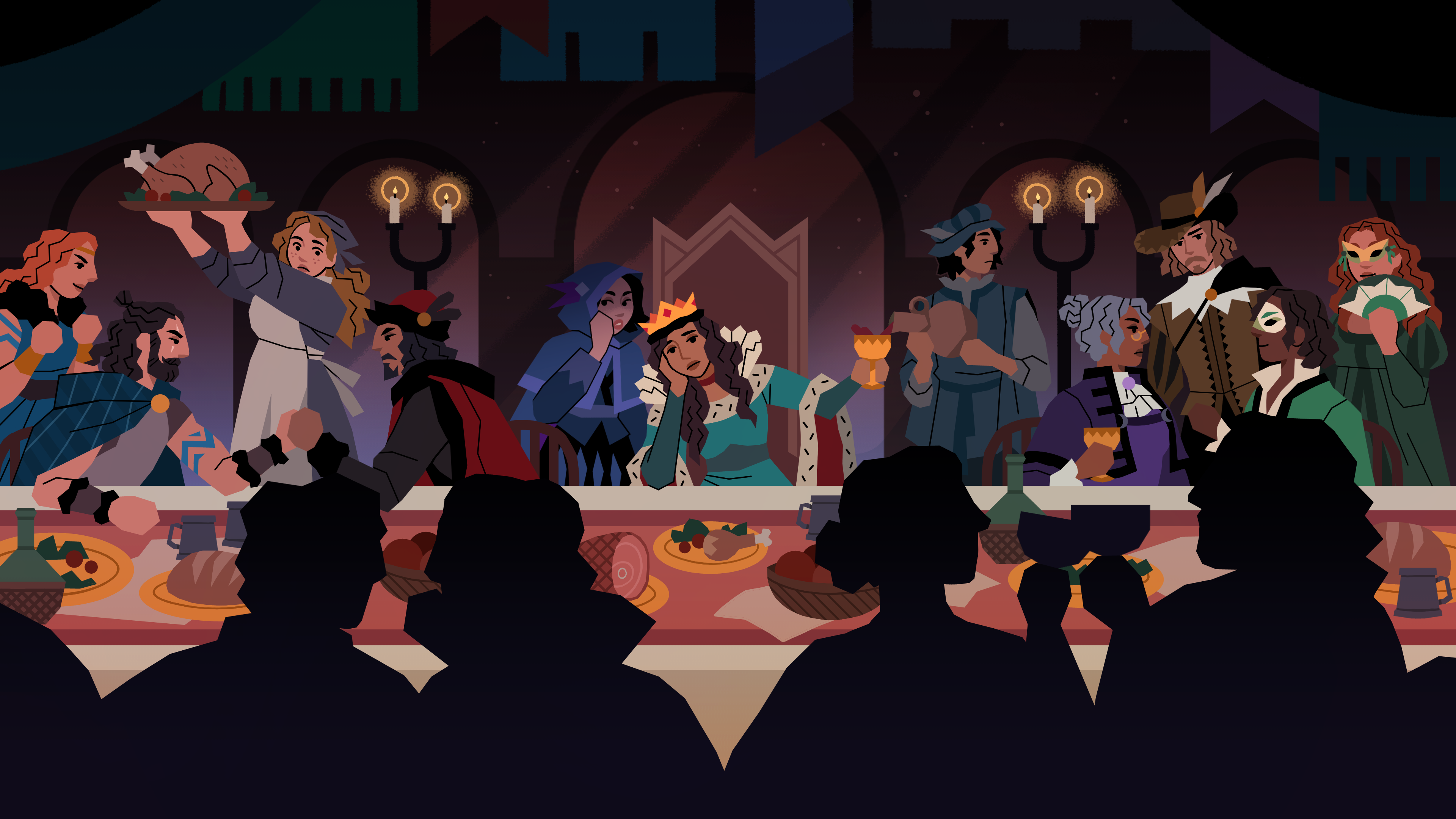Robert Houghton (University of Winchester)
So, this is the end of the fifth Middle Ages in Modern Games Asynchronous conference. Once again, we’ve had an impressive range of papers from a near global group of scholars and game developers. If you’ve missed anything, then make sure you take a look at our programme and all the papers. These will stay live and open to comments so there’s still time to ask questions and otherwise engage with our speakers.
We’ve had plenty of new faces along with numerous very well established figures, alongside representatives of fields of history, archaeology, literature, medieval(ist) studies, game studies, game design and several other disciplines. We’ve always been a platform about engaging with different subjects, but there’s perhaps been a particularly rich haul of these this year.

I think these trends are very much reflective of the overall state of the field. Medievalist game studies and game development is still very much a young discipline, but there are some strands and features which are becoming more pronounced, and an appreciable and growing number of scholars and developers for whom this media and period is a main focus of their work. We’re moving increasingly towards becoming a more established discipline, although we’re still very often fragmented along lines of research field, language and area of study. We’re no longer an embryonic field, although we’re certainly still adolescent. I’m hopeful that the broad area of study will continue to mature and develop, and that these boundaries will lessen – even if that means the emergence of a new and tangled medievalist games historiography.

The new structure of this conference has hopefully helped us to contribute to the development of the field. Moving away from Twitter has allowed us greater versatility of presentation including prose papers, translated papers and a handful of video presentations. As we’ve seen this year, this has allowed deeper and more accessible explorations of various themes than could be provided through the formatting requirements of a Twitter thread. The shift has also allowed us to include non-anglophone papers for the first time, which is at least a tentative step to mitigating language barriers within the field. Moving away from Twitter also grants us some additional stability in the short to medium term which should hopefully grant a longer and deeper reach to these papers. We’ve already a great deal of detailed discussion in our comments sections which would have been difficult to conduct in a Tweet format.
There are of course limits to these successes. We’ve had some teething issues with the new format (all of which were my fault) which have been capably resolved by the organising committee. Hopefully none of this had a visible impact on the event but sincere apologies if you’ve experienced any disruption. More significantly though, the event has remained primarily anglophone, and all of our papers were presented in Western languages. There are some practical issues and limitations here, but we do need to think more about broadening participation further. We will also need to reflect on the impact and reach of the event after we’ve seen the longer term engagement with the papers. We’re making progress on each of these issues thanks to the work of all involved, but there’s always more that we can do – and I appreciate any feedback and suggestions.

Drawing common themes together from across this year’s conference has been even more difficult than usual. The main commonality has been the ongoing trend towards more complex and varied approaches, subject matter, and case studies. We’ve seen some magnificent discussion of nuanced issues, often with reference to a substantial historiography, all of which has been compressed into some very tight word limits. We’re moving increasingly away from describing games and discussing historical accuracy towards explorations of mechanics, narrative, and play. As always, I’ve been incredibly impressed with the variety and quality of research and work on display, particularly from students and early career scholars.
It’s also been gratifying to see the representation of a wide range of games and formats. We’re still primarily engaged with computer games – and have seen a lot of very strong and interesting work on and with this medium – but the growing body of work on board games, roleplay, and LARP has made an appreciable and significant impact too. Looking at the conference papers as a whole, there’s a significant degree of overlap between gaming formats and a lot that can be learned from different genres.

Closer engagement between game developers and game scholars is also evident within a number of the papers from this year’s event. I’ve been really excited to see so much interaction in this vein as traditionally academics and industry haven’t been that good at talking to each other. Closer relationships along these lines can be a great thing from both commercial and scholarly perspectives and I very much hope that we’ll see some collaborations coming out of this conference in the future.
Where our papers have addressed the conference themes of cooperation and conflict, we’ve seen plenty of divergent considerations. It’s been very interesting to see the similarities and contrasts between PvP and PvE relationships. It feels like there’s a rich vein of study to be conducted here, potentially alongside some recent scholarship around empathetic historical engagement through games. These considerations of commercial, pedagogical, and scholarly uses of cooperation and conflict in and around games have provoked a great deal of discussion and I look forward to seeing how this develops in the next weeks.

I have a particularly long list of people to thank this year. The event is larger and more complex than ever. Our organising committee has expanded as a result and all involved have put in a substantial amount of work. I need to thank: Juan Manuel Rubio, Vinicius Marino Carvalho, and Arturo Mariano Iannace for their work in translating the conference documentation and papers; James Baillie and Vinicius for building and maintaining our webpages; Mariana Lopez, Tess Watterson, Markus Mindrebø, Arturo, James and Vinicius for moderating our sessions and managing social media; Markus for delivering the opening address; Lysianne Lasausse for organizational support; and Blair Apgar for their editing of last year’s conference proceedings. This is all above and beyond the contributions of all the organizers throughout the event and over the last year. The event could not run without their support and I am hugely grateful to them all. Beyond this, they are all conducting a range of exciting research around games and medievalism and I strongly recommend taking a look.
I also need to thank Slitherine for their sponsorship and multifaceted support this year. Enzo, Sara, and the rest of the Milan team have been exceptionally generous with their time and resources in producing the conference and allowing us to join them for their Field of Glory day. Please take a look at their range of games, including the freshly released Field of Glory: Kingdoms. There’s a lot of research and teaching potential here and I wouldn’t be surprised if we see some papers addressing this game at MAMG25.

Exilian have also been instrumental in delivering this year’s event. This forum and community now host our website (and the asynchronous conference itself). They maintain a wideranging forum for the discussion of medievalism in modern gaming which often includes many of the subjects we’ve discussed during the conference this week.
Finally, I need to thank all of our contributors. This includes our keynotes Juan Francisco Jiménez Alcázar and Karen Cook, for their insightful papers drawing on their well established experience and research. It also includes all of the developers and scholars who have presented a paper or otherwise engaged with the event. There’s a huge amount of exciting material being produced and as ever I can’t wait to see what you all do next.
We have the standard next steps for the Middle Ages in Modern Games. We have a strand at the International Medieval Congress in Leeds between 1 and 4 July – if you’re there it would be great to see you in person. The conference proceedings for our Asynchronous event will be released towards the end of this year, under the editorship of Markus Mindrebø. The Call for Papers for MAMG25 will come out early next year, keep an eye on this website and our social media for details.

Beyond this, we’re looking to expand the scope of the Middle Ages in Modern Games beyond its primary function as a series of conferences and publications. Possibilities include the development of new events, regular informal or scholarly articles, and the compilation of resources for the development and study of the Middle Ages in modern games. The hope is to develop a more enduring network of scholars and developers and continue to move the field further. If you have any suggestions or would like to be more closely involved in the future of the Middle Ages in Modern Games then please do not hesitate to get in touch.
That’s it for the formal part of this year’s conference. Please do continue to make use of the comments sections to continue discussion of each of this year’s papers – and take a look at any that you’ve missed. I’m going to be taking advantage of the format of the event to engage more closely with several more papers over the next few days. Otherwise, thank you for coming, I hope you have enjoyed the fifth Middle Ages in Modern Games Asynchronous Conference and hope to see you all again next year.


Thank you Robert, and the organising team, for another wonderful “The Middle Ages in Modern Games” conference! It has been a pleasure participating in these excellent venues of knowledge exchange, cooperation, and network. Hope to see you all again next year 🙂
Thanks for your paper and participation Jéssica! We look forward to seeing you next time.
Thank you for organizing this amazing event! I’m specially thankful that it was moved to asynchronous this year – I wasn’t able to log in the day of my talk but was able to have wonderful conversations with our colleagues regardless of that the next day!
You mentioned proceedings – can we expand on our talks for that? If so, by how much?
Thanks again for your leadership on this!
Proceedings will absolutely be going ahead, and this will give you a chance to expand on your paper. We’re finalising some details but will be in touch presently.
Thank you very much for this wrap-up and for all the work you did, Robert, and our thanks go of course to all the team. We found the new blog format much more engaging than Twitter. We actually do not use Twitter much, so we found the Twitter format a little limiting, and the need to divide the paper into threads did not really facilitate smooth reading. The way of hosting the conference as blogs makes it much easier to follow (for us) and to comment on. We look forward to the next year’s conference, and we already have some ideas we would like to explore, focusing on the convergence of the TTRPG and LARPs. Overall, it was a great experience for us and we will continue to explore the papers we have missed (due to time difference).
Anastasija and Edgar
Thanks both! I’m glad it worked so well for you.
Thanks for everything! What a wonderful array of papers, ideas, and presentations! This new format is a great resource and I’m looking forward to re-reading all the papers in due course. I appreciate the invitation to be one of the keynotes this year!
You’re very welcome Karen! Thanks for your paper and all of your engagement.